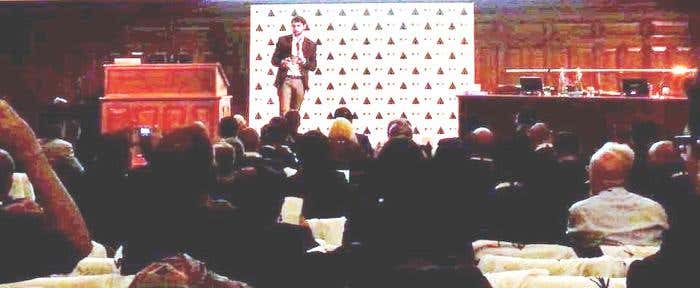Great ideas need a clear voice
Talented people may have great ideas but may never get heard or public exposure, that's exactly why presenting skills are essential.
What is a business pitch? Why have a pitch deck?
A business pitch is basically delivering a business plan verbally. A pitch typically takes the form of an entrepreneur or group of entrepreneurs presenting or describing their ideas to prospective investors.

If you need to raise funding from VCs for your startup or innovative SME, the first step is to create a pitch deck.
A pitch deck is a brief presentation (usually based on slides) that provides the audience with an overview of your business. It is often created using PowerPoint or Keynote, or lately with Prezi. Regardless of the means chosen to pitch, the aim is always the same; describing a business opportunity with the intention of securing funding to develop the idea further.
Typically, entrepreneurs commence the pitch with a description of the market and the need, and how the team intends to respond in an original and unique way to that need. The presenter then describes the opportunity and motivates a request for a certain amount of funding in return for a percentage of equity in the business. He/she then concludes with a Q&A session.
If an offer is made by an investor and it is accepted, due diligence will be undertaken to ensure that the investment opportunity is as it was described and that the key financials stand up to critical examination.
Learning to pitch
Personally I have experience pitching and public speaking, and I have seen even more pitches being performed. Fortunately — or unfortunately — the amount of preperation that someone has put into their pitch always shows.
Therefore, should "Pitch Training" be made mandatory, before startups are invited to appear in front of investors?
What do you think?
Doing a good pitch is not rocket science, but you must do your homework! First of all, explain yourself in the first minute. Explain what you do, why you do it, and why they should listen to you for the rest of your pitch. Then know your audience. The foundation of a great pitch is the research you do before the meeting or presentation starts.
- Learn what’s important to your audience.
- Do your research. Visit the organization’s Web site, use Google searches, read reports and talk to your industry contacts to gather core information about the audience and their background.
- Third, brainstorm with your team to find the connections, hooks and angles to make the pitch powerful and meaningful.

Remember you are the center stage.
Your pitch deck is just your tool: use slides to lead, not read. They should paraphrase and enhance what’s coming out of your mouth.
Come in early to the venue and check everything, have your backups. Be prepared for all possible situations, so that you can focus on your audience.
Remember, your pitch doesn’t have to be pretty, just effective.
What not to do:
A common mistake many entrepreneurs make is to pitch their product to investors, but investors don’t invest in products, they invest in businesses, and in the teams that manage these businesses.
Obvious?
So, why do many pitch decks then miss this point?
You could see it like this:
A well-structured pitch deck and a superbly executed pitch are the fastest and easiest way for you to explain your business to investors.
This improves the odds, right?
Investors see many pitches!
Therefore your task is to convince them that your business offers a greater return, with less risk, than all the other businesses that they are looking at.
And ... that you have a team, able to execute.
Author: Marnix Groet
LinkedIN profile Marnix Groet
For more info about pitching in English (or in your mother tongue) please follow the link to my blog: http://marnixgroet.blogspot.it/2017/08/the-art-of-pitching.html